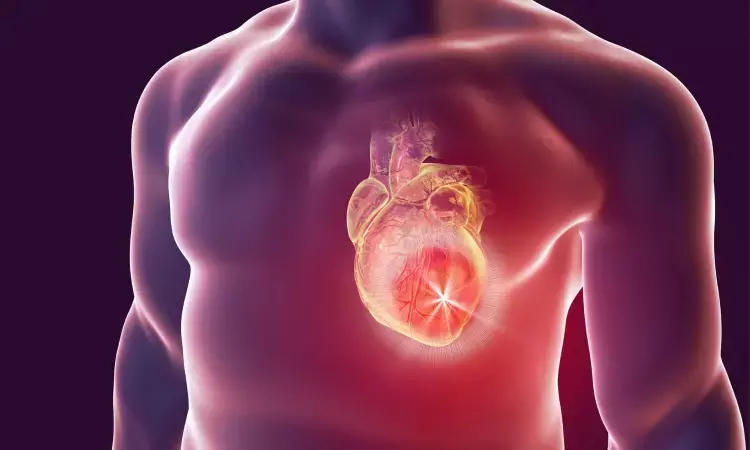- Home
- Medical news & Guidelines
- Anesthesiology
- Cardiology and CTVS
- Critical Care
- Dentistry
- Dermatology
- Diabetes and Endocrinology
- ENT
- Gastroenterology
- Medicine
- Nephrology
- Neurology
- Obstretics-Gynaecology
- Oncology
- Ophthalmology
- Orthopaedics
- Pediatrics-Neonatology
- Psychiatry
- Pulmonology
- Radiology
- Surgery
- Urology
- Laboratory Medicine
- Diet
- Nursing
- Paramedical
- Physiotherapy
- Health news
- Fact Check
- Bone Health Fact Check
- Brain Health Fact Check
- Cancer Related Fact Check
- Child Care Fact Check
- Dental and oral health fact check
- Diabetes and metabolic health fact check
- Diet and Nutrition Fact Check
- Eye and ENT Care Fact Check
- Fitness fact check
- Gut health fact check
- Heart health fact check
- Kidney health fact check
- Medical education fact check
- Men's health fact check
- Respiratory fact check
- Skin and hair care fact check
- Vaccine and Immunization fact check
- Women's health fact check
- AYUSH
- State News
- Andaman and Nicobar Islands
- Andhra Pradesh
- Arunachal Pradesh
- Assam
- Bihar
- Chandigarh
- Chattisgarh
- Dadra and Nagar Haveli
- Daman and Diu
- Delhi
- Goa
- Gujarat
- Haryana
- Himachal Pradesh
- Jammu & Kashmir
- Jharkhand
- Karnataka
- Kerala
- Ladakh
- Lakshadweep
- Madhya Pradesh
- Maharashtra
- Manipur
- Meghalaya
- Mizoram
- Nagaland
- Odisha
- Puducherry
- Punjab
- Rajasthan
- Sikkim
- Tamil Nadu
- Telangana
- Tripura
- Uttar Pradesh
- Uttrakhand
- West Bengal
- Medical Education
- Industry
Triple regression in MI patients with alirocumab linked to low LDL C and MACE

Triple regression is characterized by reduced atheroma volume, lower lipid content, and thicker fibrous caps. Researchers have found in a new study that among patients treated with alirocumab, triple regression was linked to decreased LDL-C levels and significantly fewer adverse cardiovascular events in 1 year. This study is published in the Journal of the American College of Cardiology.
The frequency, characteristics, and outcomes of patients undergoing intensive lipid-lowering therapy and exhibiting simultaneous decreases in atheroma volume, lipid levels, and increase in fibrous cap thickness (i.e., triple regression) are unclear. The objective of this study was to investigate rates, determinants, and prognostic implications of triple regression in patients who experienced acute myocardial infarction and were treated with high-intensity lipid-lowering therapy.
In patients receiving high-intensity statin therapy, PACMAN-AMI trial used serial intravascular ultrasound, near-infrared spectroscopy, and optical coherence tomography and compared the effects of alirocumab vs placebo. Triple regression was defined by a percentage of atheroma volume reduction, maximum lipid core burden index within 4 mm reduction, and minimal fibrous cap thickness increase. Researchers assessed Clinical outcomes at 1-year follow-up.
Key findings from this study are:
· 84 patients, constituting 31.7%, showed triple regression (40.8% in the alirocumab vs 23.0% in the placebo group).
· Low-density lipoprotein cholesterol levels were lower in those with vs without triple regression on-treatment. The between-group difference was −27.1 mg/dL.
· Triple regression was independently predicted by treament with alirocumab and a higher baseline maximum lipid core burden index within 4 mm with OR of 2.83 and 1.03, respectively.
· The composite clinical endpoint of death, myocardial infarction, and ischemia-driven revascularization occurred less frequently in patients with vs without triple regression (8.3% vs 18.2%)
This study demonstrated that among patients with acute myocardial infarction receiving high-intensity lipid-lowering therapy, one-third experienced a triple regression associated with alirocumab treatment, higher baseline lipid content, and reduced cardiovascular events.
As acknowledged, the study was funded by Bern University Hospital.
Reference:
Biccirè, F. G. et al. Concomitant coronary atheroma regression and stabilization in response to Lipid-Lowering therapy. Journal of the American College of Cardiology. https://doi.org/10.1016/j.jacc.2023.08.019
BDS, MDS in Periodontics and Implantology
Dr. Aditi Yadav is a BDS, MDS in Periodontics and Implantology. She has a clinical experience of 5 years as a laser dental surgeon. She also has a Diploma in clinical research and pharmacovigilance and is a Certified data scientist. She is currently working as a content developer in e-health services. Dr. Yadav has a keen interest in Medical Journalism and is actively involved in Medical Research writing.
Dr Kamal Kant Kohli-MBBS, DTCD- a chest specialist with more than 30 years of practice and a flair for writing clinical articles, Dr Kamal Kant Kohli joined Medical Dialogues as a Chief Editor of Medical News. Besides writing articles, as an editor, he proofreads and verifies all the medical content published on Medical Dialogues including those coming from journals, studies,medical conferences,guidelines etc. Email: drkohli@medicaldialogues.in. Contact no. 011-43720751


